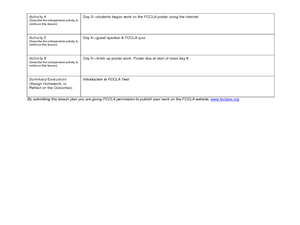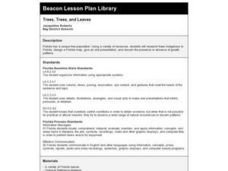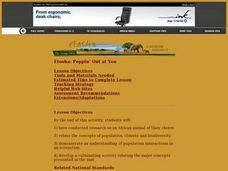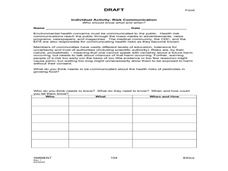Curated OER
The Miracle Resource - From Forest to Products
Young scholars create a collage of wood products labeled by type of wood product. In this product engineering lesson, students work in groups to find pictures of solid wood products, engineered wood products, wood pulp, paper products,...
Curated OER
Imagine a Kelp Forest
Students write a story based on their research of the kelp forest. In this ecosystem lesson, students view a video and research the kelp forest ecosystem. They write a short story imagining the discovery of a new species in the kelp forest.
Curated OER
Math is Everywhere!
In this everyday math skills pretest, students answer ten multiple choice questions based on their knowledge of everyday math skills such as estimation, addition, and measurement.
Curated OER
Caring for the Land
Fifth graders examine how to care for the land. In this soil management lesson, 5th graders participate in a service learning project and assist in the preservation of natural resources.
Curated OER
Now You Have It, Now You Don't
Sixth graders compare corn-based shipping peanuts to Styrofoam shipping peanuts. In this hands-on environmental awareness lesson, 6th graders try dissolving two different types of packing peanuts in water.
Curated OER
Packaging and Transport
Students examine the methods by which food is packaged and transported to their dinner tables. In this packaging and transporting lesson plan, students explore how machines help people grow food. Students also obtain knowledge about how...
Curated OER
Cosmetic Products Evaluation
Students evaluate different cosmetic products. For this chemistry lesson, students determine the physical and chemical components of their samples. They perform various test such as pH, viscosity, conductivity and formulate a conclusion...
Curated OER
Introduction to FCCLA
Learners discover the FCCLA (Family, Career and Community Leaders of America). For this FCCLA lesson, students watch a PowerPoint, participate in an a variety of activities and listen to a guest speaker in order to understand the role,...
Curated OER
Stopping Global Climate Change
Students synthesize or express concepts towards solving the question posed at each lab station about climate change. After all lab teams have finished, the teacher facilitates a class discussion on teams' responses to each station.
Curated OER
Scavenger Hunt: A Group Collection
Learners be complete a collection of living organisms and systems from the school campus.
Curated OER
Philanthropy, Volunteering And Service: the Historical Connections Lesson 2: Hunger Hurts
Students investigate the effects of hunger on a personal and community level. They examine how philanthropy can help alleviate hunger issues in the world and in their own community. They look at the available services using Internet...
Curated OER
Arthropods at Home: Spider, Isopod, or any Arthropod
Second graders observe, discuss, and record the requirements of a healthy environment for both arthropods and people by designing and maintaining an artificial habitat for an arthropod, and considering the requirements for a healthy body...
Curated OER
A Prescription for Drug Success
Students explore criticisms of the pharmaceutical drug industry. They also become aware of the difficult and lengthy process of testing new drugs by inventing fictional drugs and testing plans.
Curated OER
Introduction to Classification
Fourth graders design a classification system to categorize animate and inanimate objects. They discuss the advantages of grouping things as they classify buttons, leaves, shells.
Curated OER
Trees, Trees, and Leaves
Students research and examine trees indigenous to Florida. They develop a table/chart, draw leaves, design a map of Florida, and prepare and give oral presentations discussing the presence or absence of tree growth patterns.
Curated OER
Etosha: Poppin' Out at You
Tenth graders research an African animal of their choice and relate the concepts of population, climate and biodiversity to their animal. They examine how population interacts in an ecosystem.
Curated OER
Pond Water Web
Students familiarize themselves with the common organisms that live in a pond and discover their importance in a balanced aquatic habitat as they create food webs. They also investigate how an environmental change affects the habitat as...
Curated OER
The Gaia Hypothesis: An Approach to Problem Solving in the Environment
Students are introduced to the Gaia hypothesis by examining a conceptual sketch. In groups, they analyze the way they can use Dewey's method for problem solving to solve problems within the environment. They are given a problem facing...
Curated OER
The Energy Crisis
Students participate in different activities and discussions to analyze the energy crisis in the United States and other parts of the world. In groups, they research the availability of fossil fuels and the possible alternatives. Using...
Curated OER
How is Your Food Grown
Students consider how their food is grown due to pesticide use. They reflect on the harm done to the various groups, then discuss the ethical questions from the perspectives of different stakeholders. IN addition, they compile relevant...
Curated OER
Trophic Ecology of Humans
students analyze the place of humans among the tropic levels by observing what we eat. They calculate the caloric content of several foods commonly eaten by humans and calculate the total energy cost to grow, process, transport, store...
Curated OER
Case Study--"What Good Is It?"
Students receive a realistic introduction to the intricacies of the endangered species problem. Students examine and refine personal concepts of non-utilitarian value and biocentric stewardship. Students examine what, if any, duties the...
Curated OER
Trophic Ecology of Humans
Students analyze the trophic level of humans by first calculating the kilocalories in own their lunch. They then calulate the kilocalories in a wide variety of foods found in grocery stores and compare the kilocalories needed to acquire...
Curated OER
Melt and Pour Soap Recipes
Students are able to make many differnt kinds of soaps. They are told that they must purchase a pre-made melt and pour soap base from a craft supplier, melt it, add soap colorants and fragrances and otherr additives as you like and...
Other popular searches
- Family and Consumer Sciences
- Family Consumer Science
- Consumer Science Foods
- Consumer Science Manners
- Health and Consumer Science
- Consumer Science Fibers
- Consumer Science Fibres
- Fm & Consumer Science
- Family & Consumer Sciences
- Consumer Science Fib Res
- Consumer Science Careers
- Food and Consumer Sciences

























